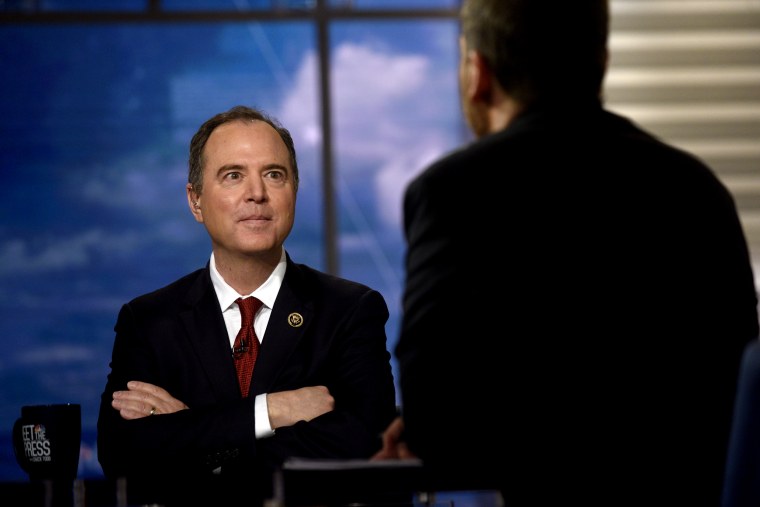WASHINGTON — House Intelligence Committee Chairman Adam Schiff, the lead Democratic impeachment manager, warned Sunday that a Senate trial without additional witnesses wouldn't translate to an exoneration of President Donald Trump, who is charged with abusing his office for political gain.
Speaking two days after the House impeachment managers wrapped up their opening arguments, and the day after Trump's legal team began their defense arguments, Schiff accused the president's team of trying to convince senators "you don't need a fair trial" that calls witnesses who had first-hand knowledge of the accusations against the president.
"If they are successful in depriving the country of a fair trial, there is no exoneration," Schiff said during an exclusive interview on NBC's "Meet the Press."
"Americans will recognize that the country did not get what the founders intended."
Schiff and his fellow House Democratic impeachment managers finished up their testimony on Friday before President Trump's legal team began their defense.
Trump's team attempted to turn the Democrats' argument on its head by accusing them of being the ones trying to interfere in the 2020 election. Defense lawyers went on to defend Trump's posture toward Ukraine, arguing that he has been focused on rooting out corruption in the country.
And they argued that none of the witnesses who spoke with the House impeachment investigators directly linked Trump to any leveraging of aid for political favors.
Democrats have been arguing from the start of the trial that the Senate should call witnesses like former national security adviser John Bolton and acting White House chief of staff Mick Mulvaney as part of the process.
But even if Democratic senators can hold their entire caucus together on the question of calling those witnesses, they'll need four GOP senators to vote with them in order to get the 51 votes needed.
It's unclear whether the presentation by impeachment managers moved any Senate votes, and a handful of senators emerged from Schiff's closing statements on Friday frustrated about his decision to cite a recent CBS report that Trump allies warned Republican senators against bucking the president.
Schiff defended his decision to evoke that report, arguing that he has to be "candid" about the challenges Republican senators face.
"It's going to require moral courage to stand up to the president. And this is a wrathful and vindictive president, I don't think there's any doubt about it," he said on "Meet the Press."
"If we can't even get the senators to call witnesses in a trial, it shows just how difficult that moral courage is."
But Republicans on Sunday offered a preview for the roadblocks that the House managers are likely to encounter in their push to call witnesses.
"I'm not going to vote to approve witnesses because the House Democrats had a lot of witnesses,' Sen. Tom Cotton, R-Ark., told CBS's "Face the Nation. "We heard from them over and over and over again this week."
Cotton said there was no need "to prolong" the trial, though he declined to "forecast" how his GOP colleagues may vote.
"If we seek witnesses, then we'll throw the country into chaos," Sen. Lindsey Graham, R-S.C., told Fox News' "Sunday Morning Futures." "We stop the trial to go to court to allow the president to litigate executive privilege or we destroy it ourselves."
Shortly after Schiff's appearance, Indiana Republican Sen. Mike Braun shared his perspective on "Meet the Press."
On the question of witnesses, Braun said that Democratic leaders knew that Republican leaders would take control of the impeachment trial once the articles were sent to the GOP-controlled Senate. And while he offered praise for the Democratic case, he said that they have not yet laid out an open-and-shut case.
"The case so far, and I'll give them credit, they put together a broad, comprehensive case," he said. "But it was circumstantial in nature."
It's to that point why Schiff has argued for new witnesses during the Senate trial. But with some Republicans floating the possibility of trading witnesses to allow the Senate to hear from Democratic targets but also those like Hunter Biden and former Vice President Joe Biden, Schiff said that the president "does not have the right to call irrelevant witnesses, or witnesses who are not fact witnesses."
"Should the trial be used as a vehicle to smear his opponent? Is that the purpose of a Senate trial? Or is it to get to the truth? Because if it's to get to the truth, Hunter Biden can't tell us anything about the withholding of the military funding," Schiff said.
Braun said senators will have to weigh the totality of the case, including the question about witnesses, within their own "political context."
"The fact that they were talking about impeachment around inauguration, it was a partisan vote coming over and it does overturn an election and it prevents another one nine months away," Braun said of the Democrats. "That's what Hoosiers are thinking about."

